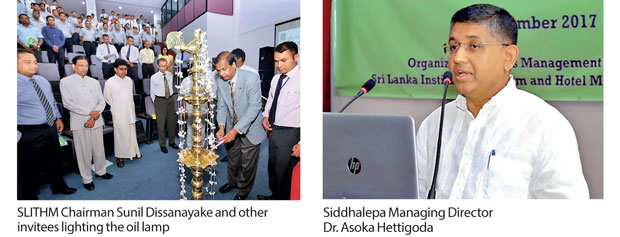12 Sep 2017 - {{hitsCtrl.values.hits}}

The Sri Lanka Institute of Tourism and Hotel Management (SLITHM) is to conduct a series of tourism related training programmes for industry stakeholders.
The aim of the programme which is being conducted under the auspices of the Ministry of Tourism Development and Christian Religious Affairs is to uplift the standards of tourism services across the country.
Tourism Development and Christian Religious AffairsMinisterJohn Amaratungawho has been the driving force behind the initiative is of the view that Sri Lanka must focus on improving its tourism service delivery in order to be competitive in attracting high spenders.
“I’m pleased to see SLITHM taking the lead role in this endeavour and I hope that the private sector will take a cue from this and initiate training programmes of their own to cater to the segments that may be outside the scope of the SLITHM programmes,” Amaratunga noted.
A newly formed Tourism Event Management Unit of SLITHM has been tasked with formulating and conducting the training programmes which will essentially target entrepreneurs and service providers associated with the tourism industry.
The first such programme titled ‘Health and wellness tourism business, development and training opportunities for stakeholders’ was held on 6th September at the SLITHM Auditorium in Colombo.
“The programme is in line with the Tourism Ministry’s wider national objective of providing a range of training opportunities for industry stakeholders to grow their tourism related businesses through better operational knowledge, skills and competencies,”said SLITHMChairmanSunil Dissanayake.
“It is important to provide tourism-related professional education with a certification. Health and Wellness is a key area that lacks professional education. We need to provide them with training beyond the technicalities in ayurvedic spa treatments,” he added.
Dissanayake said the Sri Lanka Tourism Development Authority (SLTDA) was in the process of introducing new regulations to standardize the health and wellness sector.
“These regulations are not to control but to standardize services and ensure better facilities,” said Dissanayake.
As an initial step SLITHM has identified ten different training areas in collaboration with the industry, academia and regulatory bodies. They include: Health and Wellness Tourism, Adventure Tourism, Spiritual and Religious Tourism, Wildlife and Nature Tourism, Recreational Tourism, Archaeology and Research, Community Tourism, Eco Tourism, Home Stay, Village Stay and Farm Stay Tourism.
The programme content and resource persons will be sourced through joint collaboration of the SLITHM, industry professionals, academia and relevant regulatory bodies. The main objectives of the training programme is to provide an opportunity for industry stakeholders to be updated on latest trends, knowledge and practices, to facilitate a dialog between academic expertise and industry stakeholders, and to reduce the knowledge gap of existing tourism service providers. Participants will be issued a certificate at the conclusion of the programmes.
04 Jan 2025 18 minute ago
04 Jan 2025 46 minute ago
04 Jan 2025 3 hours ago
03 Jan 2025 03 Jan 2025
03 Jan 2025 03 Jan 2025